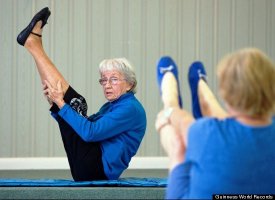Like Riding a Bike.
 |
| Amster-damn! There are a lot of bikes! |
"I remember this. I think I remember this. Do I remember this? What do I remember about this? How does this work, again? What happens now?"
People talk with great flippancy about how picking some skills back up is "just like riding a bike." This simile doesn't work for me. When I was growing up, I had roller skates. At some point someone taught me how to ride a bike, but I only remember my skates. As a result of this, I reached adulthood being a less-than-adept bicyclist. It took an exhilarating, very late night, vodka-dampened ride through Vienna a few years ago to help me understand why anyone would want to ride a bike at all: it's incredibly fun. You also get places faster than walking and it's great cardio. Win win win!
Even after more practice, I'm still a bit of a wobbly-kneed baby deer every time I put my feet on the pedals. When your early foundation in something is weak, what you learned before does nothing to prepare you for being good at it later. It's "just like riding a bike" you say? What, so it's shaky, tentative and uncertain? It's going to make my palms sweat and my heart race? Sounds like a hoot.
This is a difficult place to find yourself, this not being good at things that you're supposed to have figured out by the time you reach adulthood. First, you have to admit that you're not very good at these things. This is a difficult step: Yes, I have a problem. Then, you have to do a searching inventory of everything you learned about these things up until now and root out the truthful, useful information from the misconceptions and lies. And make no mistake: some of your information is skewed and inaccurate.
During my intake session with my therapist earlier this year, I told her I didn't want to be in a relationship because they're just "so much work, so heavy." She replied by cocking her head to the side and asking, "Are they?" Experience is the most powerful of teachers and represents the absolute truth until it's cracked open by another experience. In the foreignness of new, it's easy to feel like a wobbly-kneed baby deer, mistrustful and anxious over this altered state of being. We know that our old, conditioned way of behaving isn't working, but the presentation of familiar stimuli can easily lead to a conflict between well established and burgeoning patterns.
"I remember this. I think I remember this. Do I remember this? What do I remember about this? How does this work, again? What happens now?"
How did you learn to ride a bike? Confident, committed, with both feet clipped firmly to the pedals? Shaky, with your left hand on the right pedal, right foot on the left pedal, like some bizarre, moving game of Twister? Not at all?
We have all come to this point in our lives with gaps in knowledge and ability. That's great! It means that we still have things to learn and master, and are therefore very much alive. You can expend a lot of time and energy denying this, or hating on yourself for being imperfect; see if anything changes. My suggestion? Be honest, gentle and curious. It'll be easier to figure out how to get both feet confidently on the metaphorical (or literal) pedals. Seek guidance from a mentor who does well what you hope to do well. With enough practice and the establishment of a solid foundation, most anything can become effortless and intuitive. Keep up.


Comments
Post a Comment